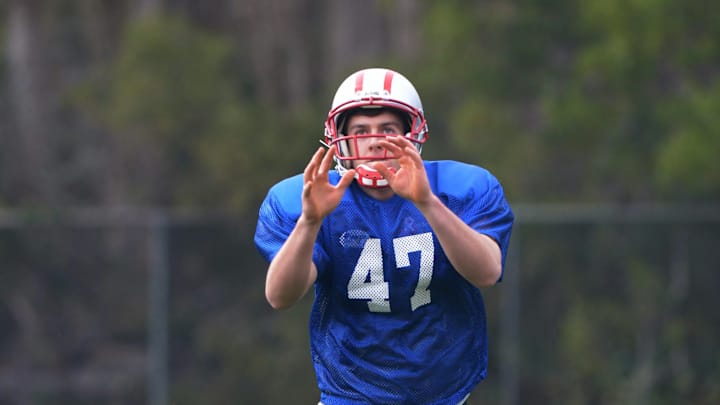Australian academy prepares punters for US college football

MELBOURNE, Australia (AP) The fog is still lifting off a deserted playing field on the outskirts of this southern Australian city as 10 aspiring college football punters begin their morning drills.
No one watches them practice on a chilly Melbourne day. Soon, they hope, almost all of them will be showing off their skills in front of crowds of more than 100,000 while punting at powerhouse college football programs 10,000 miles away.
Experienced Australian rules football players for many years have considered punting in the National Football League after their pro careers at home. Now more young Australians are training with the Prokick Australia academy with plans to bypass the Australian Football League entirely and go straight to the states for a college scholarship.
The last two Ray Guy Award winners - to the top punter in the country - were born in Australia and trained at Prokick.
Director Nathan Chapman says it's the education, not the lure of the NFL, that is prompting the latest batch of young Australian rules footballers to switch sports.
Chapman took his shot at the NFL in 2004 after 10 years with topflight AFL clubs Brisbane and Hawthorn. After being signed by the Green Bay Packers, he was cut the week before the start of the season.
On his return to Australia, he decided that college teams offered more opportunities for young Australians.
''When I went over, there was not much happening with Australians and the college system, and because the NFL can sign you today and cut you tomorrow, I thought the better focus was to put kids into college,'' Chapman said.
Australian involvement in U.S. college football can be traced back to 1898, when Melbourne Football Club Aussie rules player Patrick O'Dea joined the University of Wisconsin as a fullback. Known to fans as the ''Kangaroo Kicker,'' O'Dea went on to coach Notre Dame and was inducted into the College Football Hall Of Fame in 1962.
More recently, former AFL players like Ben Graham and Sav Rocca have forged NFL careers and shown that Australian rules can provide an ideal foundation for punting. Now more than 30 Australians are punting for U.S. schools at various levels. Almost all of them worked out at Prokick.
''To be honest, we don't talk about the NFL much because we want them to focus on getting the degree,'' Chapman said.
The exchange of U.S. degrees for Australian punting skills is proving a popular one for many colleges. Tom Hackett at Utah and Tom Hornsey at Memphis were the top punters in the country the past two seasons, changing the game with their rugby-style drop punts and positional play.
The punt-style kick is an integral part of Aussie rules - used to score and pass, as well as kicking for field position. The tumbling flight of an end-over-end kick is effective at finding the sideline, while also proving difficult to catch.
Prokick product Nick Porebski, 22, spent the last two years playing at Utah's tiny Snow College. This month he moves up to Oregon State on a full scholarship.
Porebski appeared on track for a professional Aussie rules career before a series of shoulder injuries.
''I got a letter from Nathan when I was about 15 or 16 asking if I'd like to try punting. I didn't really know what it was at the time, so I just continued playing Aussie rules,'' he said. ''Once I had those injuries, I had another look at the letter and decided I might pursue it and see what happened.''
Michael Dickson, 19, who just earned a scholarship with Texas and plans to study business, also had his sights set on the AFL as a member of the Sydney Swans club's academy program.
''The opportunities over there are so much better with schooling, and I needed a break from AFL, so this was the perfect opportunity to keep my competitive edge up and get an education,'' he said.
Dickson got his first look at the home of the Longhorns when he visited Austin in June. By September, he should be playing in front of wild crowds of 100,119.
''I think I have some idea, but I don't think it'll sink in until I get over there,'' he said.
Porebski said the cultural differences are as challenging as college football.
''It was definitely very loud. The (American) accents were ringing in my ears the whole time,'' he said. ''It took me a good two months to get used to the accent. But everything was different. The food, the cars they drive and pretty much the way they go about everything was different.''
As with most Prokick candidates, Dickson and Porebski got their scholarships based purely on video footage and a recommendation from Chapman.
Chapman said it has taken at least eight years to develop trust with college coaches.
''And as coaches transfer from one school to another, they say, `We know where I got him from, I've gone to a new school, let's get another one of these Aussie guys,''' he said. ''If we've sent the right guys over, our reputation then holds.
''Some coaches still can't take that jump, but there are others who are more than happy.''
